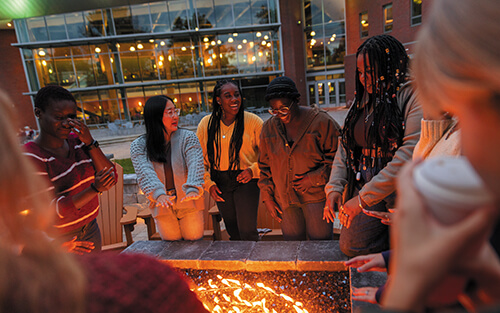Messiah’s Black Student Union got its start in the 1970s

In the 1970s, Black students launched a club called the Black Student Union (BSU) to offer support spiritually, socially and academically.
There were plans to promote programming related to the Black experience on campus and to attend related off-campus events. They also encouraged a Black studies major, ultimately leading to the first Afro-American literature class.
Forming the club in the ’70s obviously didn’t “fix” student and faculty concerns about diversity. President D. Ray Hostetter responded by creating an ad hoc faculty-student Committee on Discrimination, which set out to define racial discrimination and formulate recommendations for how to remedy it on campus.
After the original students of the BSU graduated, the club seemed to disappear.
“I came in ’79 and there was nothing going on,” said Gina Gilliam ’83, a retired federal government public relations director.
She says when she approached student government about reforming the BSU, there was confusion. She was asked why she couldn’t just join the international club.
Concerned about providing spaces on campus for Black students, she resurrected the BSU and became its president. Annette (Richardson) Hampton ’76, one of the original members, worked at Messiah by then and became the BSU advisor.
Today, students who join the BSU are just as motivated to share experiences and create spaces of conversation. Hope Hammond ’22, a social work major and club president, says the BSU of today shares a similar purpose to the BSU of the past.
“The BSU today still finds that to be a focal point when making decisions on what topics to discuss and what events to host for our students. We continue to be a safe space for our Black population on campus to feel heard and loved” said Hammond.
Today’s BSU discusses issues related to campus and the larger Messiah community, a goal that the original BSU set out to accomplish in the 1970s.
“While we focus on addressing issues that largely affect the Black community, we also hold conversations on tensions between our community with others, and often discuss steps that can be taken to resolve and eradicate those tensions. Conversations like these create the space for reconciliation to take place on an interpersonal level, in hopes that we may continue to work together towards reconciliation in our broader communities,” said Hammond.
There have been some misconceptions over the years that membership to the club is closed. That’s not the case, says current club advisor Sarah Jones, an associate professor of nursing at Messiah University.
“As the club seeks to strengthen community at Messiah, membership is always open to students of diverse ethnicities and cultural backgrounds to join, learn, lament and progress toward hope and healing with BSU. As club advisor, I am honored to support the BSU leadership in its endeavors to build up and enlighten our Messiah student body, said Jones.
Hammond says she has felt the positive effects of the space BSU provides for Black students.
“Coming to Messiah, I knew that I wanted to learn, heal and to navigate predominately white spaces differently. BSU was the space that allowed me to do that,” she said. “I not only met some of my closest friends, but I was immersed in an environment where Black culture, intelligence and beauty were celebrated and praised. It inspired and created an openness for me to reflect, learn and grow into my most genuine self.”
— Molly McKim ’23 and Anna Seip